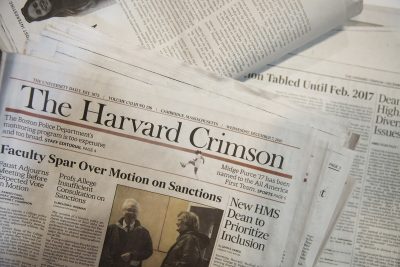
Administrative censorship of student newspapers is on the rise, according to a report released Dec. 1 by the American Association of University Professors. Journalism professors and student journalists from the Boston area said they were not surprised by these findings, but said they believe censorship of local student journalists has yet to become a problem at schools in the city.
The report, titled “Threats to the Independence of Student Media,” was the work of a committee composed of members from the AAUP, the College Media Association, the National Coalition Against Censorship and the Student Press Law Center.
The CMA published a survey in March that mentioned 20 reports of administrative censorship or funding cuts of student journalism that occurred over three years that had gone unreported because faculty members feared for their jobs. After seeing the survey results, the four groups on the committee prepared the report to demonstrate the importance of freedom of the press on college campuses, according to the report.
The report surveyed college and university advisers. It defines censorship incidents as the advisers “suffering some degree of administrative pressure to control, edit, or censor student journalistic content.” The report described the effects these measures can have on independent student publications, similar to The Daily Free Press.
“It has become disturbingly routine for student journalists and their advisers to experience overt hostility that threatens their ability to inform the campus community,” the report stated. “Administrative efforts to subordinate campus journalism to public relations are inconsistent with the mission of higher education to provide a space for intellectual exploration and debate.”
Chris Daly, a journalism professor at Boston University, stressed the importance of student journalism that is independent of school administrations in order to avoid censorship.
“Truly independent student media are training grounds for real journalists and they should resist every effort to try to come under the influence of university administrators,” Daly said.
Dan Kennedy, a journalism professor at Northeastern University, said independence from universities is the best way for student publications in Boston to avoid censorship.
“One of the problems of having an official student newspaper is that the college or university itself is the publisher,” Kennedy said. “Fundraising and recruitment have become relentless preoccupations, and bad news in the student paper can be bad for business.”
Kennedy acknowledged the problem of covering expenses for independent student papers, but advised that they avoid printing in order to save time and money.
“It seems to me a student-run, all-digital news organization could do some really robust journalism at very little or no cost,” Kennedy said. “Putting out a print newspaper requires a huge amount of work, but the students are mastering skills that have no value in the marketplace.”
Mariel Klein, the president of Harvard University’s student newspaper, The Harvard Crimson, said Harvard’s relationship with its student paper is healthy but separated.
“Overall, we tend to have a very amicable relationship with the university because we are committed to fair and balanced reporting,” she said. “Do we run stories that they don’t like? Yes, and I think that that’s part of our job as journalists — to cover Harvard and all of its highs and all its lows.”
Boston-area students, unaffiliated with their school’s newspapers, also agreed that independence is vital for student newspapers.
Daniel Glassman, a freshman at Emerson College, said student papers are responsible for reporting any relevant information, even if it could be controversial.
“If something was going on at a school and the administration was at fault, the students have a right to know and a right to be made aware of it,” Glassman said.
Nick Boyd, a junior at Northeastern, said student papers should not be censored in any way by the institutions they are affiliated with.
“It is vitally important that student newspapers be independent of administrations,” Boyd said. “This separation is necessary for the newspaper to criticize the administration without fear of reprisal. We see this happen with social justice student organizations, and I would not want it to happen to our press.”






















































































































